Best CRM Software for HR in 2025
A CRM for HR teams is your go-to tool for simplifying and improving how you manage your workforce. It keeps everything in one place—employee data, recruitment, onboarding, performance tracking, and engagement—so you can focus on what really matters: Supporting your team and helping them thrive.
Why You Can Trust the Expertise of Sonary
At Sonary, we are committed to providing accurate and trustworthy information to help you make informed decisions. Our research process is meticulous, transparent, and guided by a dedication to maintaining the highest standards of integrity, ensuring accurate, real-world insights.
Read more
Unlike many other review platforms, we conduct in-depth evaluations of the software and services we feature. Our expert team tests and actively uses the tools we review to understand their features, performance, and value comprehensively. Our assessments are based on real-world use, giving you insights beyond surface-level descriptions. Our research methodology includes analyzing key consumer factors such as pricing, functionality, device usability, scalability, customer support quality, and unique industry-specific features. This hands-on approach and dedication to transparency mean you can trust Sonary to deliver regular, up-to-date content and recommendations that are well-researched and genuinely helpful for your business needs.Best CRM for HR

Features
General Features
Sales
Automation
Pros & Cons
Pros
Cons

Features
General Features
Sales
Automation
Pros & Cons
Pros
Cons

Features
General Features
Sales
Automation
Pros & Cons
Pros
Cons

Features
General Features
Sales
Automation
Pros & Cons
Pros
Cons

Features
General Features
Sales
Automation
Pros & Cons
Pros
Cons
Quick Comparison
| CRM Software | Key HR Features | Ideal For | Free Trial/Plan |
| Salesforce | Employee service management, AI-powered automation, Advanced analytics and reporting | Medium to large enterprises needing a scalable, AI-driven HR CRM | 30-day free trial |
| Pipedrive | Recruitment pipeline management, Task automation, Custom fields for employee data | Small HR teams focused on recruitment | 14-day free trial |
| Zoho CRM | Recruitment pipelines, Self-service portals, Performance analytics | Small to medium-sized businesses needing customization and affordability | 15-day free trial |
| HubSpot | Applicant tracking, Recruitment workflows, Engagement analytics | Startups and small businesses needing a free or low-cost solution | Free plan available |
| monday.com | Visual recruitment tracking, Feedback tools, Onboarding automation | HR teams requiring a visual, flexible solution for recruitment | 14-day free trial |
Our Top Picks
We’ve chosen the best CRM tools to help you simplify your HR tasks. From managing hiring to keeping track of employee engagement, these tools are designed to make your job easier and more organized.
Salesforce
 Track contacts & manage sales pipeline
Track contacts & manage sales pipeline  Get a complete view of every customer
Get a complete view of every customer Salesforce is a leading cloud-based software company specializing in customer relationship management (CRM) solutions. Salesforce has grown into a global enterprise, offering a comprehensive suite of applications designed to help businesses connect with customers, automate tasks, and deliver personalized experiences.
Salesforce offers a Human Resources (HR) suite designed to enhance employee engagement, streamline HR processes, and foster a productive work environment. Leveraging its robust Customer Relationship Management (CRM) platform, Salesforce extends its capabilities to meet the dynamic needs of HR departments.
Key Features
- Employee service management: Empowers your employees with self-service tools, enabling them to access information, request support, and find resources from a centralized platform. For HR teams, it streamlines support and processes through HR case management, enhancing efficiency and responsiveness.
HR service console: Provides HR teams with a unified workspace to manage employee support cases and requests. It integrates AI, productivity tools, and knowledge bases – offering a comprehensive view of employee information. - Automation and AI integraסtion: This solution incorporates AI-driven automation to handle routine HR tasks, such as case classification and routing, enabling HR professionals to focus on strategic initiatives. The AI capabilities also assist in generating replies, summaries, and knowledge articles, enhancing the overall efficiency of HR operations.
- Employee engagement tools: Facilitates collaboration and knowledge sharing among employees through features like Chatter and Communities, promoting a connected and engaged workforce.
- Integration capabilities: Seamlessly integrates with various Human Capital Management (HCM) systems and other back-office tools, ensuring a cohesive HR ecosystem.
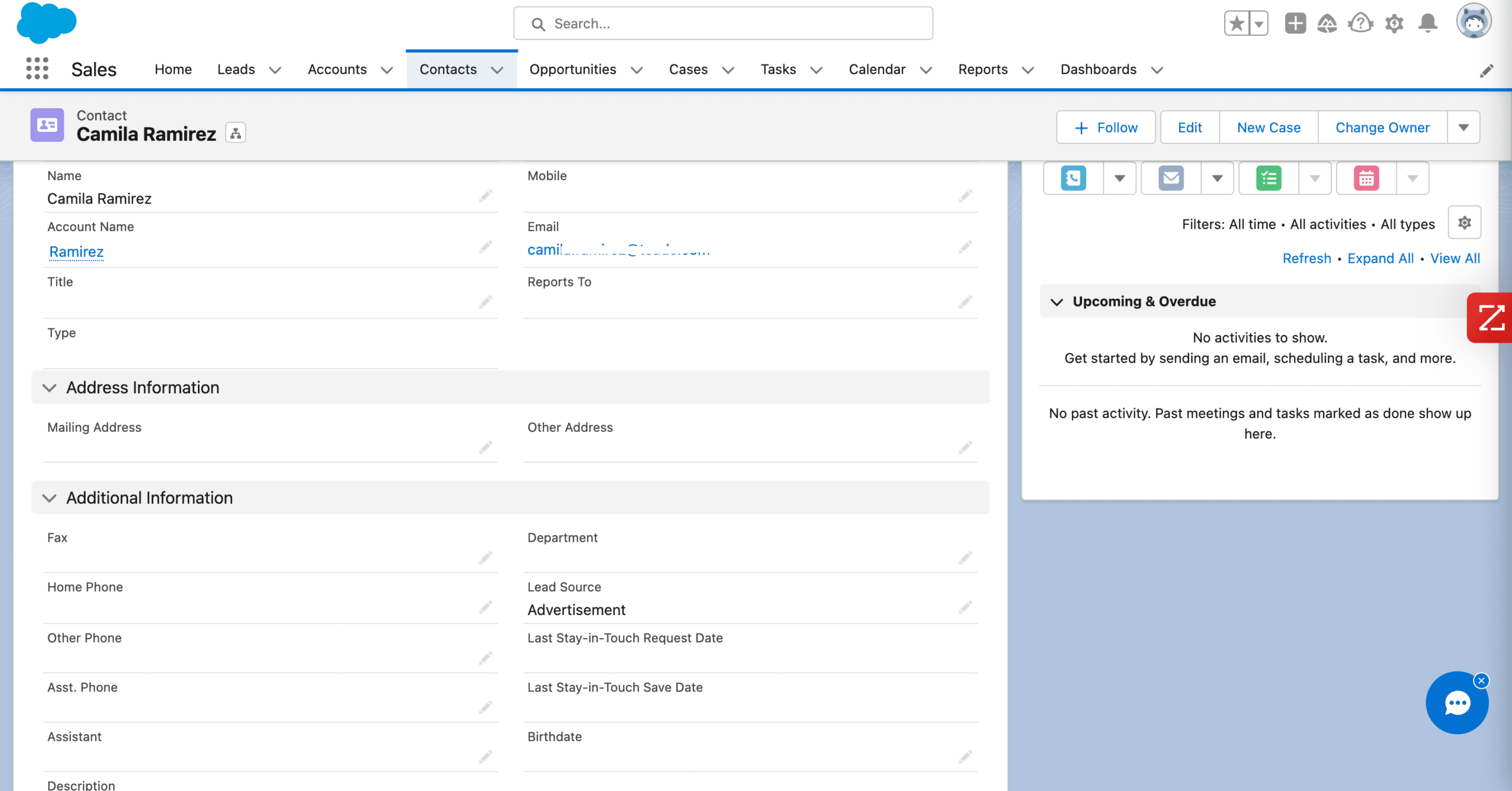
Pros and Cons
- Pros
- Wide-ranging tools for all HR functions.
- Scalable for businesses of any size.
- Customizable workflows and dashboards.
- Improves employee experience with self-service and engagement tools.
- Cons
- Steep learning curve for extensive features.
- High cost may deter smaller organizations.
- Integration with existing systems can be complex.
Who It’s For
Salesforce CRM for Human Resources is best suited for medium to large organizations that prioritize employee engagement and efficient HR operations. Its extensive suite of features makes it ideal for businesses with complex HR needs, such as managing large workforces, streamlining case management, and enhancing employee support.
Pipedrive
 Mobile app means you never miss a sale
Mobile app means you never miss a sale  300+ integrations enhance functionality
300+ integrations enhance functionality Pipedrive is primarily known as a sales-focused CRM, but its strong pipeline management capabilities make it an adaptable tool for HR recruitment and employee management.
Designed with simplicity and efficiency in mind, Pipedrive helps small HR teams streamline their hiring processes, maintain candidate records, and improve communication. Its visual and customizable pipelines offer a clear overview of the recruitment lifecycle, making it a valuable asset for HR teams focused on hiring.
Key Features
-
Recruitment pipeline management with visual layouts: Each stage can be clearly defined from candidate sourcing to final onboarding, making tracking progress and identifying bottlenecks easy. Recruiters can drag and drop candidates across stages, ensuring a smooth and organized hiring process.
-
Task automation for interview scheduling and follow-ups: Automate time-consuming tasks such as sending interview reminders, follow-up emails, or status updates to candidates.
-
Custom fields for tracking employee data: Pipedrive offers customizable fields, enabling HR teams to store and manage important candidate and employee information such as job preferences, certifications, and interview scores.
-
Integration with email and scheduling tools: Seamlessly integrate Pipedrive with email services like Gmail or Outlook and scheduling tools such as Google Calendar.
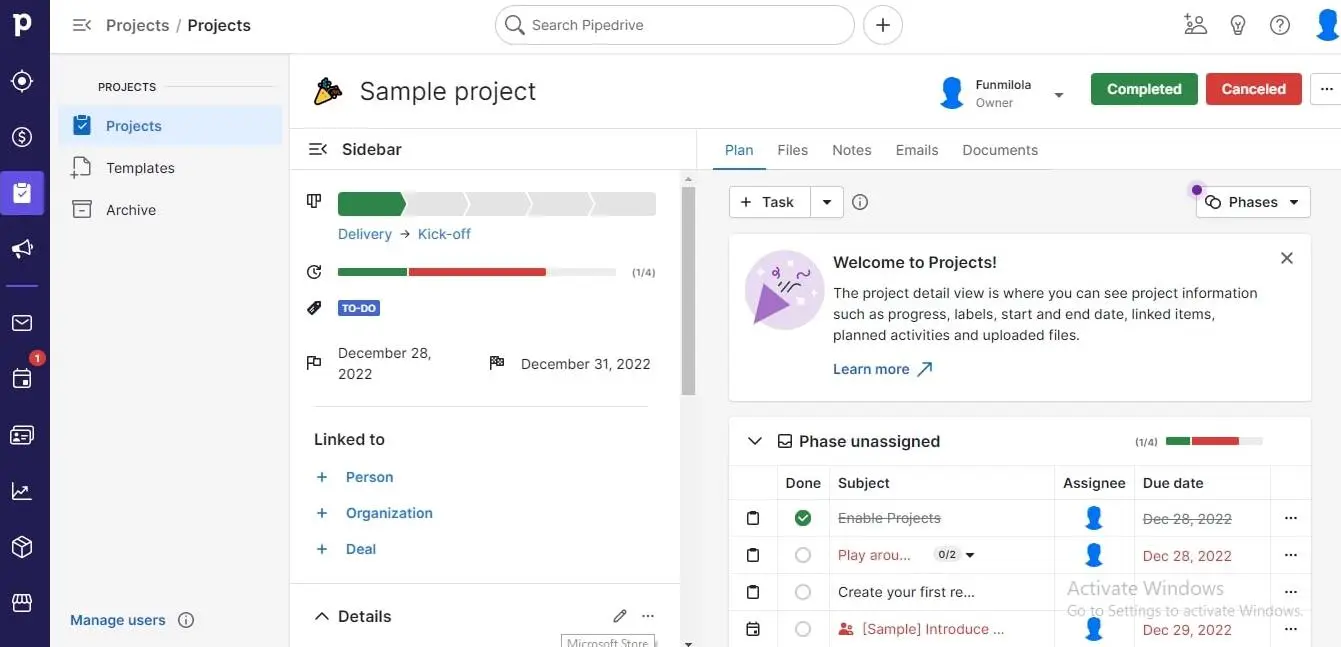
Pros and Cons
- Pros
- Affordable plans suitable for small teams and startups.
- User-friendly interface with visually organized pipelines.
- Great for managing recruitment workflows with drag-and-drop tools.
- Cons
- Limited HR features without customization or integrations.
- Not ideal for large organizations with complex needs.
Who It’s For
Startups, small agencies, and growing companies will benefit most from Pipedrive’s affordability, ease of use, and recruitment-specific capabilities. By leveraging Pipedrive’s visual pipelines and automation features, HR teams can manage candidate relationships effectively and improve the overall efficiency of their hiring process.
Zoho CRM
 Increase sales with multichannel software
Increase sales with multichannel software  In-depth analytics to track success
In-depth analytics to track success Zoho CRM is a highly versatile platform that caters to a variety of industries, including human resources. Known for its affordability, customization, and ease of use, Zoho CRM provides HR teams with tools to streamline recruitment, enhance employee engagement, and automate routine processes.
With its powerful integration capabilities and extensive suite of features, Zoho CRM is well-suited to businesses seeking an adaptable and efficient solution for HR management.
Key Features
- Recruitment pipeline management: Enables HR teams to create and manage recruitment pipelines that track candidates through every stage of the hiring process. HR professionals can use drag-and-drop functionality to move candidates through stages, ensuring a smooth and efficient hiring experience.
- Employee self-service portals: Empowers employees to update their personal information, view company policies, and manage requests like leave applications.
- Performance analytics and goal tracking: Managers can define key performance indicators (KPIs), track progress toward goals, and generate detailed reports that provide insights into individual and team achievements.
- Automation of repetitive HR tasks: Automates routine HR tasks such as sending interview reminders, scheduling meetings, and notifying team members of important updates. This automation saves time, reduces errors, and allows HR professionals to focus on strategic initiatives.
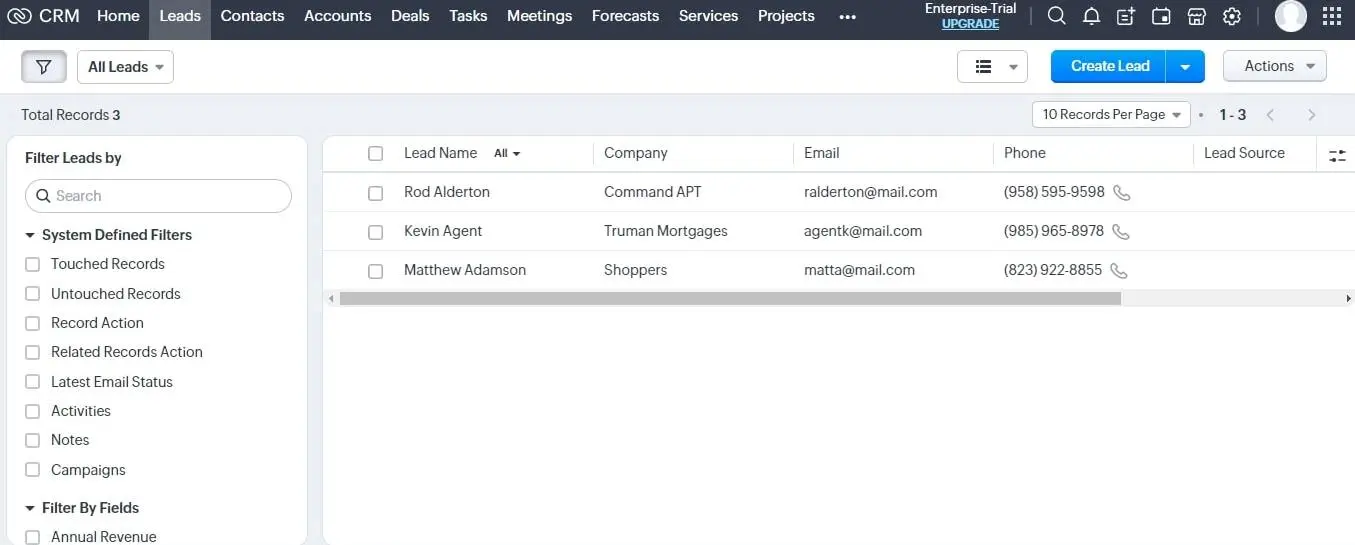
Pros and Cons
- Pros
- Affordable plans for businesses of all sizes.
- Scalable to grow with your company.
- Integrates with Zoho apps and third-party tools.
- Customizable modules for specific HR needs.
- Cons
- Advanced features have a learning curve.
- Limited offline access due to cloud-based design.
Who It’s For
Zoho CRM is best suited for small to medium-sized businesses looking for an affordable, customizable, and scalable HR management solution. It particularly benefits organizations that value automation, integration, and a centralized system for managing recruitment, employee performance, and engagement.
Related Articles
HubSpot
 Unified platform for sales and marketing
Unified platform for sales and marketing  Track customer interactions in real time
Track customer interactions in real time While HubSpot is widely recognized for its marketing and sales solutions, its CRM capabilities extend to HR needs, offering powerful tools to manage recruitment, employee engagement, and workforce analytics.
With its intuitive interface and robust customization options, HubSpot CRM empowers HR teams to streamline processes, foster employee satisfaction, and align HR strategies with overall organizational goals.
Key Features
- Applicant tracking and recruitment workflows: HubSpot CRM provides customizable recruitment pipelines to track candidates throughout the hiring process. HR professionals can easily monitor each stage, from initial application reviews to final interviews, ensuring a structured and transparent recruitment workflow.
- Integration with marketing tools: HubSpot’s strong marketing capabilities make it ideal for HR teams looking to enhance employer branding. Organizations can effectively attract top talent and promote their company culture by integrating recruitment efforts with email marketing, social media campaigns, and content marketing tools.
- Employee engagement analytics: With built-in analytics, HubSpot CRM allows HR teams to gather data on employee satisfaction, engagement levels, and feedback trends. These insights help identify areas for improvement and drive initiatives that boost workforce morale and retention.
- Customizable dashboards: HR teams can create personalized dashboards to monitor critical metrics, such as time-to-hire, retention rates, training progress, and diversity statistics. These visual dashboards enable quick insights and data-driven decision-making.
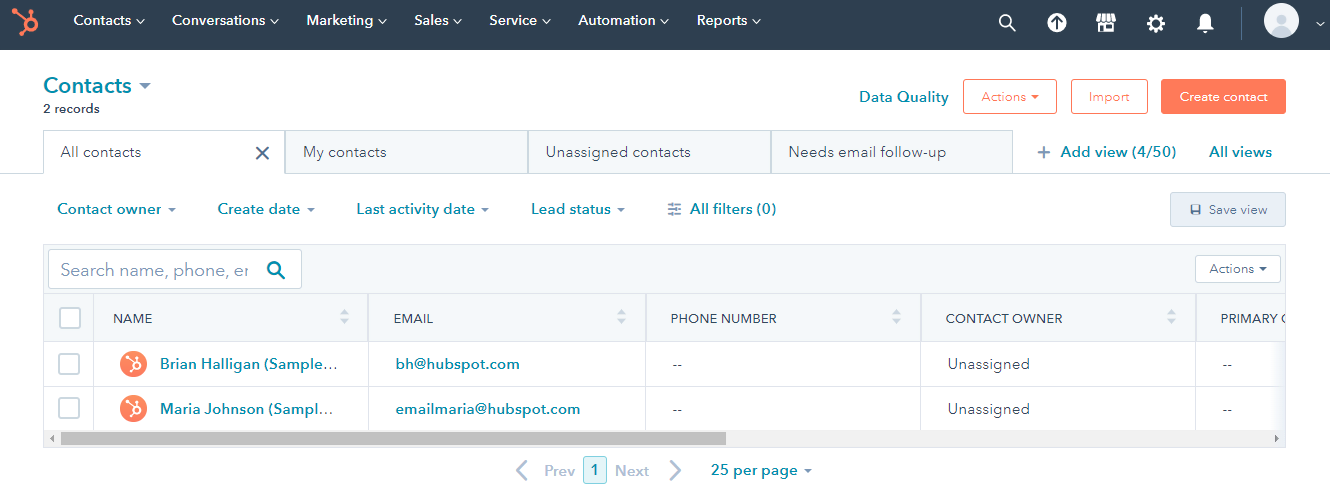
Pros and Cons
- Pros
- Free plan with essential CRM features for small budgets.
- Integrates well with third-party tools like job boards and payroll systems.
- Clean, user-friendly design for easy adoption.
- Cons
- Lacks built-in HR-specific features.
- Premium plans can be expensive for smaller teams.
Who It’s For
HubSpot is ideal for startups and small businesses looking for a free or low-cost CRM solution that can be tailored for HR purposes. Its seamless integration with marketing tools makes it particularly valuable for organizations focusing on employer branding and recruitment.
monday.com
 Sync emails to track client interactions
Sync emails to track client interactions  Import leads with integrations
Import leads with integrations monday sales CRM is a powerful and flexible solution designed to help businesses manage customer relationships, streamline sales processes, and improve team collaboration. As part of the larger monday.com Work OS platform, this CRM product is built to be highly customizable, making it a perfect fit for businesses of all sizes and industries.
Monday sales CRM, stands out for its adaptability, making it an excellent choice for diverse teams, including HR professionals.
Key Features
- Customizable pipelines: Adapt pipelines for recruitment workflows, tracking candidates from application to onboarding, thereby streamlining the hiring process.
- Contact management: Store comprehensive employee profiles, including personal details, job history, and performance records, enabling easy access and management.
- Sales automation: Automate HR tasks like sending onboarding materials, scheduling interviews, and setting reminders for performance reviews, reducing manual workload.
- Visual dashboards: Create dashboards to track HR metrics such as employee turnover rates, training completion, and recruitment status, aiding in data-driven decision-making.
- Collaboration tools: Enhance collaboration among HR team members and other departments by sharing documents, updates, and feedback seamlessly.
- Integrations: Integrate with HR-specific tools such as payroll systems, learning management systems (LMS), and employee engagement platforms to create a cohesive HR ecosystem.
- Activity tracking: Track employee interactions, training sessions, performance evaluations, and other activities to maintain detailed employee records.
- Document management: Maintain employee documents such as contracts, policy acknowledgments, and training materials in a centralized repository.
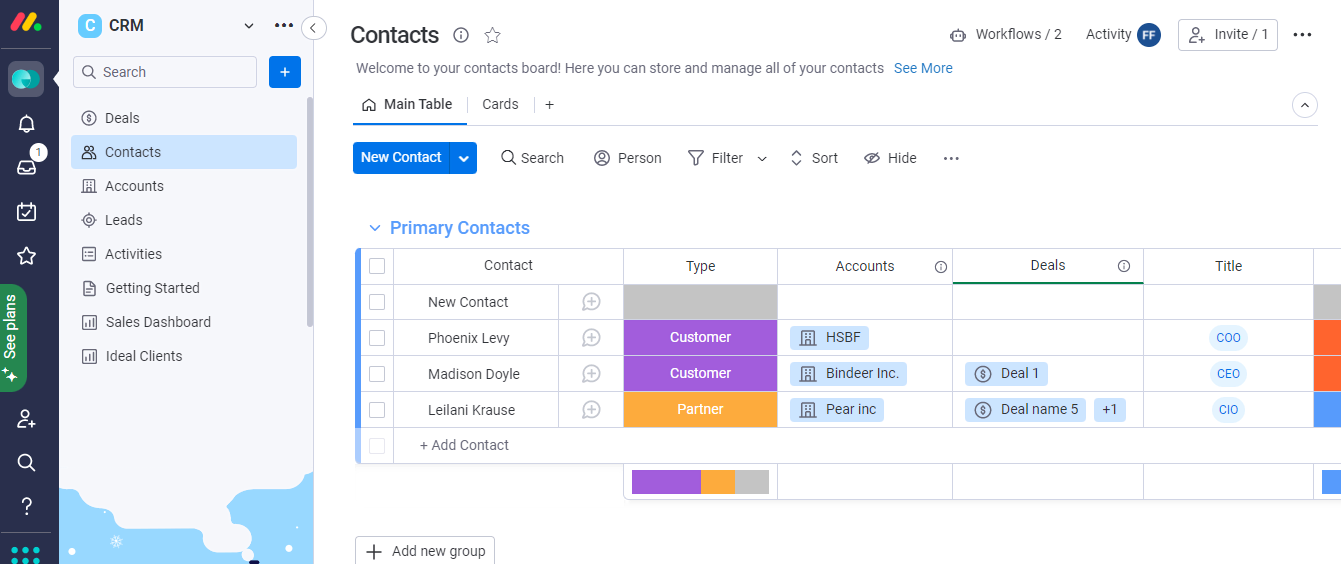
Pros and Cons
- Pros
- Customizable workflows, dashboards, and pipelines.
- Versatile for sales, recruitment, and engagement.
- Real-time collaboration with shared updates and tools.
- Integrates with Slack, HubSpot, Gmail, and Zoom.
- Scales with small teams and large enterprises.
- Cons
- Advanced features can be costly.
- Complex setups require time to learn.
- Limited offline access.
- Not specialized for HR-specific needs.
Who It’s For
Monday Sales CRM is best suited for small to medium-sized businesses seeking an affordable and scalable CRM solution. For HR teams, monday sales CRM provides a centralized system that simplifies recruitment, onboarding, performance tracking, and employee engagement, making it a versatile choice for managing both customer relationships and internal workflows.
The Importance of CRM in Human Resources
While CRM systems are traditionally associated with customer management, their application in HR is transformative. Modern HR teams face increasingly complex demands, from managing large-scale recruitment efforts to retaining top talent and ensuring seamless internal communication. HR-focused CRMs simplify these processes by offering a centralized platform to handle critical HR functions.
- Streamlining workflows: CRM systems automate routine HR tasks such as applicant tracking, onboarding processes, and employee record maintenance. This allows HR teams to focus on strategic initiatives like workforce planning and employee engagement rather than administrative burdens.
- Improving employee satisfaction: With tools to track employee feedback, monitor performance, and personalize development plans, CRMs help HR professionals address employee concerns proactively, fostering a positive work environment.
- Driving better organizational results: By integrating analytics and insights, HR CRMs enable organizations to optimize hiring strategies, improve retention rates, and align workforce capabilities with business goals.
Key Benefits of a CRM for Human Resources
1. Enhanced collaboration
HR CRMs break down silos between HR and other departments. Shared access to employee information and seamless communication tools ensure departments work cohesively, enhancing productivity and alignment.
2. Data-driven decision-making
Advanced reporting and analytics capabilities enable HR teams to use real-time data for workforce planning, identifying skill gaps, predicting turnover trends, and improving hiring decisions.
3. Improved candidate and employee experiences
A well-implemented CRM ensures smooth candidate experiences from application to onboarding. Similarly, employee engagement tools improve ongoing interactions, building trust and long-term loyalty.
4. Streamlined recruitment processes
HR CRMs simplify recruitment by automating repetitive tasks like scheduling interviews, tracking candidates, and sending follow-ups. This saves time and ensures a more organized hiring process, enabling HR teams to focus on finding the best talent.
5. Increased operational efficiency
Automating routine HR workflows—such as leave requests, onboarding tasks, and compliance checks—reduces manual errors and frees up HR professionals to concentrate on strategic activities that add value to the organization.
6. Enhanced employee retention
By providing insights into employee satisfaction, performance trends, and engagement levels, HR CRMs help identify potential issues early. Tailored strategies can then be implemented to boost morale and retention, ensuring a more stable workforce.
Choosing the Best HR CRM
When selecting a CRM, it’s important to consider various factors to ensure the platform aligns with your organization’s needs.
1. Cost and availability of free trials
Many CRM software providers offer free trials to help businesses evaluate their platform’s features. Consider trialing “CRM software free trial” options to ensure the tool meets your needs without immediate financial commitments.
2. Integration capabilities
Evaluate whether the CRM integrates seamlessly with essential tools like payroll systems, benefits administration platforms, and communication software. These integrations can streamline workflows and improve data accuracy, ensuring that all systems work harmoniously together.
3. Scalability
As your organization grows, your HR CRM must adapt to handle increased data and user demands. Choose a system that supports scaling without compromising performance. Ensure that the software can accommodate additional users and data storage as your company expands. Look for flexible pricing models and features that can be easily upgraded to support your growing needs.
4. Ease of use
Select a CRM that is intuitive and user-friendly, minimizing the learning curve for your team. A straightforward interface ensures that employees can quickly navigate and utilize the system effectively, enhancing productivity and reducing training time.
Steps to Evaluate an HR CRM
1. Trial period usage tips
Use the free trial period to test specific HR workflows, such as recruitment campaigns or performance reviews.Involve multiple team members during the trial to gather diverse feedback on usability and functionality.
2. Assess customer support
Reliable customer support and training resources are essential, especially during implementation. Look for platforms offering 24/7 support, knowledge bases, and hands-on training.
3. Leverage user reviews
Compare user reviews and testimonials to understand the CRM’s real-world application and reliability. Look for insights on customer satisfaction, system uptime, and post-sales support.
Final Thoughts
Before committing to a platform, take advantage of the free trials and plans these CRMs offer. They provide an excellent opportunity to explore features, assess usability, and determine the best fit for your organization’s unique needs. Investing time in choosing the right tool will ensure a smoother implementation process and a greater return on investment. Embrace the future of HR management with the right CRM, and watch as your HR processes become more efficient, your employees more engaged, and your organization better prepared for success.
FAQ
Q: How is an HR CRM different from traditional CRM software?
A: Traditional CRMs focus on customer relationship management, while HR CRMs are designed specifically for managing employee relationships, recruitment, and internal processes like onboarding and performance tracking.
Q: Is there a free CRM solution for HR?
A: Yes, HubSpot CRM provides a free plan with essential HR features such as applicant tracking, recruitment workflows, and engagement analytics. It’s a great starting point for startups or small businesses
Q: What size company benefits most from CRM software?
A: Companies of all sizes can benefit, but HR CRMs are particularly valuable for medium to large organizations that need to manage recruitment, employee data, and workflows at scale.
Q: Can CRM for HR integrate with other tools?
A: Yes, most CRMs are designed to integrate with payroll software, benefits platforms, time-tracking systems, and communication tools like Slack or Microsoft Teams. Integration ensures seamless data flow across systems and reduces manual entry.

